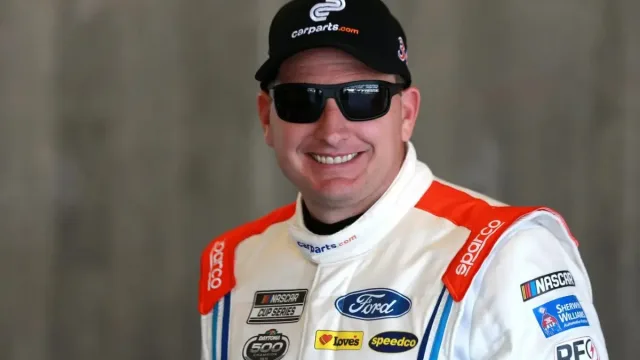Key Highlights
- McDowell’s career included nearly two decades without significant victories, exemplifying perseverance.
- From 2009 to 2013, McDowell raced with underfunded teams using a start-and-park strategy.
- He focused on personal goals, like finishing 28th, to stay motivated during challenging times.
- The 2008 Texas crash highlighted racing dangers and underscored NASCAR’s safety advancements.
- McDowell’s journey reflects resilience, transforming struggles into eventual success at the Daytona 500.
The Daytona 500 Victory
Michael McDowell’s victory at the 2021 Daytona 500 marked an essential moment in his racing career, symbolizing not just a win but a tribute to perseverance amidst adversity.
After an arduous expedition spanning 358 Cup Series starts without a victory, McDowell’s top-place finish at NASCAR’s most prestigious event was nothing short of extraordinary. As his No. 34 car crossed the finish line, the racing world watched in awe, seeing what many deemed a miraculous achievement.
The moment was steeped in significance, as the victory propelled McDowell into the ranks of racing legends, securing his place in the sport’s most coveted winners’ circle. The scene was electric, with confetti cascading and champagne flowing, transforming a career once overshadowed by a violent crash in Texas in 2008 into one of success.
This victory served as a reflection of his tenacity, forever redefining McDowell’s legacy in the annals of NASCAR history.

The Struggles Behind the Victory
While the spotlight often shines on the glory of victory, the path Michael McDowell traveled to reach the pinnacle of NASCAR was fraught with challenges that demanded exceptional resilience. Behind the fairytale of his Daytona 500 win lies a narrative of perseverance, where success emerged from relentless dedication and grit.
McDowell’s career, spanning nearly two decades, saw him navigate the often unforgiving world of motorsports—a domain where many would falter without the allure of imminent success. He finds pride not solely in his victories but in his 500th Cup start, a confirmation of his steadfast commitment.
The Start-and-Park Years
During the challenging start-and-park years between 2009 and 2013, Michael McDowell’s role in NASCAR took on a unique and often overlooked form. Driving for underfunded teams like Tommy Baldwin Racing, he participated in races with the primary aim of starting, completing a few laps, and retiring early to secure minimal prize money. This approach, commonly known as “start-and-park,” was a tactical decision to avoid the high costs of potential damages.
“I know how tough it was for 360 of those, to be like, ‘I’m gonna still show up every week knowing it’s not going to be good,’”
“I was always like, ‘I want to get to 28th before I pull off,’ or, ‘I want to pass this car before I pull off.’”
“Sometimes it was like, ‘I want to be best on pit road or coming to a green-flag stop,’ and I would practice those things.” – Michael McDowell
Despite the routine nature of these races, McDowell found ways to maintain his motivation. Instead of succumbing to the challenges, he set personal goals, such as reaching 28th place or improving his performance in specific race segments.

The Texas Crash
In the annals of NASCAR history, the 2008 Texas crash stands out as a dramatic tribute to both the perils of racing and the advancements in safety technology.
Michael McDowell’s near-fatal accident during the qualifying session for the Samsung 500 at Texas Motor Speedway remains etched in the minds of motorsport enthusiasts. As his car hurtled towards the wall at almost 190 mph due to a catastrophic right-front sway bar failure, the impact set off a series of eight harrowing barrel rolls.
Remarkably, McDowell emerged unscathed, a demonstration of the effectiveness of NASCAR’s Car of Tomorrow (COT), which was developed in response to the tragic loss of Dale Earnhardt Sr.
The incident emphasized the critical importance of safety innovations in the sport. For McDowell, surviving such an ordeal shifted his perspective, placing greater value on endurance and longevity in racing, rather than singular victories.
A New Chapter with Spire Motorsports
Initiating a new chapter with Spire Motorsports, Michael McDowell’s adventure reflects a narrative of resilience and persistence, highlighted by a steadfast dedication to his craft.
In 2025, McDowell sets forth on this quest driving the No. 71 car under a multi-year contract, symbolizing a notable milestone in his career. The NASCAR community reveres his story as a proof of perseverance, honoring the silent battles fought away from the limelight.
His experience emphasizes a profound truth: the real victories are not always captured in televised moments but arise from enduring belief through countless challenges.
McDowell’s passion for racing never faltered, even during periods that appeared fruitless. It was this steadfast love for the sport that propelled him to eventual success at the Daytona 500.
Now, with Spire Motorsports, McDowell’s career path illustrates how dedication and persistence can pave the way for new opportunities and success.

News in Brief: Michael McDowell Opens Up on the Painful Years Spent Racing
Michael McDowell’s path through racing depicts a narrative of perseverance and ultimate success. Despite years blemished by the frustrations of start-and-park strategies and the harrowing Texas crash, McDowell remained resolute. His victory at the Daytona 500 marked a crucial moment, symbolizing the reward for his steadfast dedication. Shifting to Spire Motorsports opened new avenues for growth and success, highlighting how persistence and resilience can rewrite a seemingly predetermined path, transforming years of struggle into a celebrated achievement.
ALSO READ: Michael McDowell Breaks Misconceptions About His Identity: “I’m Genuinely Happy, But…”
